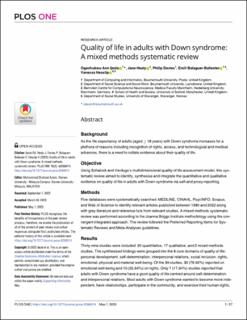| dc.contributor.author | Ijezie, Ogochukwu Ann | |
| dc.contributor.author | Healy, Jane | |
| dc.contributor.author | Davies, Philip | |
| dc.contributor.author | Balaguer-Ballester, Emili | |
| dc.contributor.author | Heaslip, Vanessa | |
| dc.date.accessioned | 2023-10-17T07:47:44Z | |
| dc.date.available | 2023-10-17T07:47:44Z | |
| dc.date.created | 2023-06-05T12:28:38Z | |
| dc.date.issued | 2023-05 | |
| dc.identifier.citation | Ijezie, O, A., Healy, J., Davies, P., Balaguer-Ballester, E. & Heaslip, V. (2023) Quality of life in adults with Down syndrome: A mixed methods systematic review. PLOS ONE, 18 (5), e0280014 | en_US |
| dc.identifier.issn | 1932-6203 | |
| dc.identifier.uri | https://hdl.handle.net/11250/3096867 | |
| dc.description.abstract | Background
As the life expectancy of adults (aged ≥ 18 years) with Down syndrome increases for a plethora of reasons including recognition of rights, access, and technological and medical advances, there is a need to collate evidence about their quality of life.
Objective
Using Schalock and Verdugo’s multidimensional quality of life assessment model, this systematic review aimed to identify, synthesise and integrate the quantitative and qualitative evidence on quality of life in adults with Down syndrome via self-and proxy-reporting.
Methods
Five databases were systematically searched: MEDLINE, CINAHL, PsycINFO, Scopus, and Web of Science to identify relevant articles published between 1980 and 2022 along with grey literature and reference lists from relevant studies. A mixed methods systematic review was performed according to the Joanna Briggs Institute methodology using the convergent integrated approach. The review followed the Preferred Reporting Items for Systematic Reviews and Meta-Analyses guidelines.
Results
Thirty-nine studies were included: 20 quantitative, 17 qualitative, and 2 mixed methods studies. The synthesised findings were grouped into the 8 core domains of quality of life: personal development, self-determination, interpersonal relations, social inclusion, rights, emotional, physical and material well-being. Of the 39 studies, 30 (76.92%) reported on emotional well-being and 10 (25.64%) on rights. Only 7 (17.94%) studies reported that adults with Down syndrome have a good quality of life centred around self-determination and interpersonal relations. Most adults with Down syndrome wanted to become more independent, have relationships, participate in the community, and exercise their human rights. Self-reported quality of life from adults with Down syndrome was rated higher than proxy reported quality of life. Discrepancies in quality of life instruments were discovered.
Conclusion
This review highlighted the need for a better systematic approach to improving the quality of life in adults with Down syndrome in targeted areas. Future research is required to evaluate self-and proxy-reporting methods and culture-specific quality of life instruments that are more appropriate for adults with Down syndrome. In addition, further studies should consider including digital assistive technologies to obtain self-reported quality of life data in adults with Down syndrome. | en_US |
| dc.language.iso | eng | en_US |
| dc.publisher | Public Library of Science (PLoS) | en_US |
| dc.rights | Navngivelse 4.0 Internasjonal | * |
| dc.rights.uri | http://creativecommons.org/licenses/by/4.0/deed.no | * |
| dc.subject | Down | en_US |
| dc.subject | Downs | en_US |
| dc.subject | livskvalitet | en_US |
| dc.subject | systematisk kunnskapsoppsummering | en_US |
| dc.title | Quality of life in adults with Down syndrome: A mixed methods systematic review | en_US |
| dc.type | Peer reviewed | en_US |
| dc.type | Journal article | en_US |
| dc.description.version | publishedVersion | en_US |
| dc.rights.holder | © 2023 Ijezie et al. | en_US |
| dc.subject.nsi | VDP::Samfunnsvitenskap: 200::Sosialt arbeid: 360 | en_US |
| dc.source.pagenumber | 0 | en_US |
| dc.source.volume | 18 | en_US |
| dc.source.journal | PLOS ONE | en_US |
| dc.source.issue | 5 | en_US |
| dc.identifier.doi | 10.1371/journal.pone.0280014 | |
| dc.identifier.cristin | 2151827 | |
| dc.source.articlenumber | e0280014 | en_US |
| cristin.ispublished | true | |
| cristin.fulltext | original | |
| cristin.qualitycode | 1 | |

